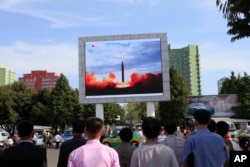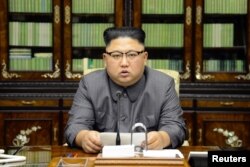The next ballistic missile launch by North Korea could come within a few days, according to U.S. government and outside analysts.
October 9 marks the anniversary of North Korea's first nuclear test in 2006. And October 10 is when the increasingly isolated state celebrates the 1945 establishment of its ruling Workers' Party of Korea.
"North Koreans always have a good sense of timing," said former CIA analyst Sue Mi Terry, the Bower Group Asia's managing director for Korea. "Kim Jong Un will show that he lives up to his 'Rocket Man' billing."
President Donald Trump has recently repeatedly belittled the North Korean leader as "Rocket Man."
Rocket test
The next rocket launch by North Korea could be another Hwasong-12 (HS-12), which is a mobile, solid-fueled, nuclear-capable medium-range ballistic missile, or the Hwasong-14 (HS-14), first tested in July, which is believed to be a two-staged version of the HS-12, giving it a longer and intercontinental range.
"I think they are not done with testing the HS-12 into the Pacific. They also have yet to start testing the HS-14 at anything like its full range," said Joshua Pollack, a senior research associate with the Middlebury Institute of International Studies at Monterey.
"Once they have done that a couple of times, I would be concerned about the potential for an atmospheric nuclear test over the Pacific," Pollack, also editor of the Nonproliferation Review, told VOA.
Russian media on Friday quoted a lawmaker in Moscow as saying North Korea is preparing to test a long-range missile able to reach the West Coast of the United States.
The comment was made by Anton Morozov, a member of the Russian Duma's international affairs committee, who was among lawmakers who returned home Friday after a four-day visit to Pyongyang for "high-level meetings."
"They are preparing for new tests of a long-range missile. They even gave us mathematical calculations that they believe prove that their missile can hit the West Coast of the United States," Russian media quoted Morozov, a member of a right-wing populist party, as saying.
"As far as we understand, they intend to launch one more long-range missile in the near future," Morozov explained. "And in general, their mood is rather belligerent."
The comment from Moscow prompted the U.S. dollar — after rising to a two-month high earlier in the trading day — to tumble. It also sent yields of U.S. Treasury notes lower, as investors cut portfolio risks and moved money to the safety of Treasuries, according to financial analysts.
Trump comments
Indications of a possible launch come amid an unsettling comment made by U.S. President Donald Trump on Thursday evening. Alongside top defense officials and military officers, the president remarked to reporters that they were witnessing "the calm before the storm."
Pressed to clarify and asked whether he was referring to Iran, North Korea, the Islamic State or some other potential clash, Trump replied, "you'll find out."
On Friday, again pressed by reporters to clarify the remark during a signing of a manufacturing day proclamation, the president repeated, "you'll find out."
Subsequently, White House Press Secretary Sarah Huckabee Sanders was asked whether the president was merely being mischievous or his comment telegraphs something ominous.
"He's not messing with the press," Sanders replied, noting that "we have some serious world issues here."
Asked if North Korea, specifically, is "the storm," since she also made reference to continuing pressure on Pyongyang, Sanders said she was just using the North Koreans as an example.
"I think we've got a lot of bad actors in the world — North Korea, Iran. There are several examples there," she said during the daily press briefing.
U.S. Secretary of State Rex Tillerson last week said Washington had a direct communications path with Pyongyang but that the North Koreans had shown no interest in dialogue. Trump later dismissed any prospect of talks with North Korea as a waste of time.
"It pays to continue to provoke from the North Korean perspective. Since they are determined to finish their nuclear program, the North has both technical and political need to continue to test," said Terry, who also was formerly Korea/Japan director at the National Security Council. "Kim Jong Un wants to make clear he will not back down under Trump's threats."
Terry adds it is imperative for Kim "to project an image of strength to his own people and to the world. A long-range missile test makes most sense to maximize the political impact internally and externally."


